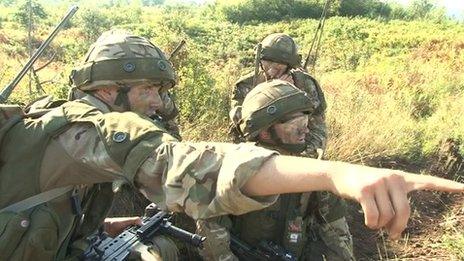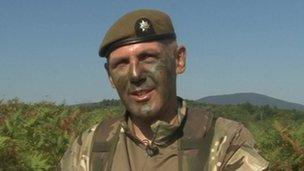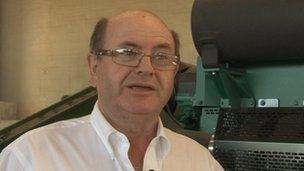Territorial Army faces new challenge as regulars are cut
- Published
The Ministry of Defence pays reservists' salaries while they are deployed and compensates employers for time lost
They have sometimes been dismissed as "weekend warriors" who lack the fitness, discipline and commitment of regular soldiers.
But the Territorial Army (TA) - in the process of being rebranded the Army Reserve - already makes up a sizeable part of the British Army's manpower and will soon be playing an even greater role.
More than 100 reservists from the 3rd Battalion of the Royal Anglian Regiment have just returned from a training exercise in Croatia, a first for the British Army.
Such exercises could soon be more commonplace as the annual training commitment for reservists is increased.
Under the government's Army 2020 review, external, the size of the regular army is being reduced by a fifth and reservists will have to help meet the shortfall.
They are already paid, but reservists could also get military pensions and healthcare benefits in a bid to attract the recruits needed.
But as the proportion of reservists-to-regulars increases, so too will the burden placed on part-time soldiers.
The government is investing £1.8bn into the Reserve Forces - Army, Royal Navy and Royal Air Force - over the next 10 years.
But last month, confidential memos revealed the Army Reserve was already missing its recruitment targets.

Reservists from the 3rd Battalion of the Royal Anglian Regiment have been training in Croatia under the supervision of regulars from the 2nd Battalion
They showed that from April to June, only 367 soldiers enlisted, about a quarter of the target.
Looking to future
The 3rd Battalion of the Royal Anglians is already one of the most operationally-experienced units within the Army Reserve, having deployed in Iraq, Afghanistan and Cyprus.
Former Royal Anglian commander Col Richard Kemp said the Army was moving towards being "part-time" and "civilianised"
Nicknamed the Steelbacks, the battalion is based at Bury St Edmunds in Suffolk and recruits across Norfolk, Suffolk, Essex, Cambridgeshire Bedfordshire, Hertfordshire, Northamptonshire, Leicestershire and Lincolnshire.
On Exercise Sava Star in Croatia, 120 reservists trained under the supervision of regulars from the regiment's 2nd Battalion and alongside Croatian soldiers.
"We're looking five, 10, 15 years into the future and trying to identify what sort of challenges the Army will face," said their commanding officer, Lt Col Paul Morris.
'Credible operational experience'
"The skill-set we're trying to instil within our soldiers is one of flexibility, robustness and an ability to cope with whatever is thrown at them in the future."
Asked if reservists had thrown off the "weekend warriors" tag, he said: "If this battalion is anything to go by, yes.
"We've got some real credible operational experience within the soldiers in this unit."
The battalion currently has 374 members but will need to recruit about 60 more.
Its soldiers include Maj Gavin Rushmere, from Norwich.
"The attraction for me is that my job is mainly office-based," he said.
"This gets me out, gives me adventure and a little bit of challenge in life."
'Doing my bit'
But for the Army Reserve to work, it needs supportive employers willing to release their employees for training and operations.
Maj Rushmere is an accountant for Aquablast, based in Beccles, Suffolk.
Managing director Donald Blair said he supported the Reserve on principle, but that releasing any more employees for military service would be difficult.

Maj Gavin Rushmere said serving in the Army Reserve gave him an extra challenge in life
"We're only a small company. I've got 18 employees so I think I'm doing my bit at one," he said.
"Two could be a struggle, especially if the demands are going to be more onerous on the men and there's going to be a requirement for them to go on active service more often."
He said although businesses were compensated while employees were away, too much bureaucracy was involved.
"There's lots of form-filling for very little money," he said.
A survey by the Federation of Small Businesses (FSB) in January, external found 36% of respondents would not consider employing a reservist, and that two in five believed the proposed changes would have a negative impact on their businesses.
Iain Wicks, development manager for Essex FSB, said: "Members are saying to us 'where there are reservists, yes we will support them' but in turn, the government needs to support businesses to allow those members of staff to be out for periods of time."
'Highly-motivated employee'
The job of promoting the Reserve to employers belongs to an organisation called SaBRE (Support for Britain's Reservists and Employers).
Kristina Carrington, campaign director for East Anglia, said: "Most companies are happy, so long as they understand the reasons why and the benefits that come back into the workplace.
"They get a highly-motivated employee who comes with a whole extra raft of skills that the employer doesn't pay for.

Donald Blair believes in supporting the Reserve but said releasing employees could be a struggle
"For small to medium enterprises, while their employee is mobilised they will get a flat payment of £500 a month during that mobilisation period, and that is designed to lessen that financial impact on the companies."
The region's 2,000 reservists may not be professional soldiers but they bring fresh civilian skills to the battlefield.
It's now up to the government to convince their bosses they can bring added value to them.
- Published3 July 2013
- Published31 January 2013
- Published9 November 2012
- Published7 November 2012
- Published5 November 2012
- Published1 November 2012
- Published13 October 2012
- Published5 July 2012